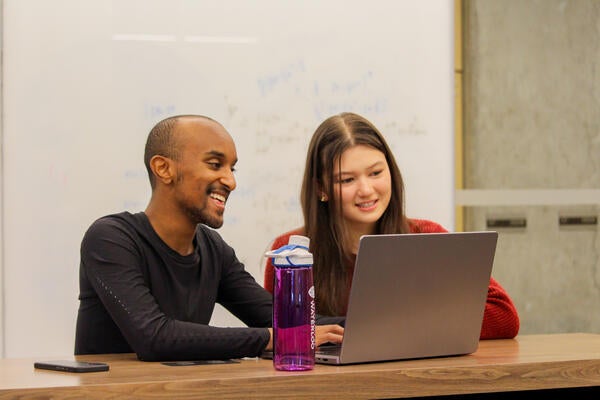
Teaming up to go above and beyond
UW Orbital is innovating outside of the requirements for student satellite contest

UW Orbital is innovating outside of the requirements for student satellite contest
By Carol Truemner Faculty of EngineeringFueled by passion for the final frontier, UW Orbital is building a satellite members hope will someday blast off into space.
The year-old student team is working on CubeSat, a fully functioning satellite, for research in earth-centred orbit, called Eternium-III, and to compete in 2023’s Canadian Satellite Design Challenge.
The approximately 70 members, who are mainly engineering students, are developing a single three-unit Cubesat, which is about the size of three Rubik's Cubes stacked together or a milk container.
A low-cost alternative to traditional multimillion-dollar satellite projects, a CubeSat allows smaller organizations like student teams to become involved in space initiatives.
About a dozen post-secondary institutions from across the country will take part in next year’s Canadian Satellite Design Challenge to be held in Ottawa. First prize is funding to launch the winning school’s CubeSat.
Supervised by George Shaker, a Waterloo professor crossed-appointed to electrical and computer engineering, and mechanical and mechatronics engineering, UW Orbital is a rebranded version of the University of Waterloo Satellite Team (WatSat), which operated from 2010-2018.
Many members of WatSat and other CubeSat teams are providing mentorship to UW Orbital as it builds its entry for the design challenge as well as a space community within the University of Waterloo.
While the pandemic had many members working remotely for months, the team’s seven subteams – command and data handling (firmware), electrical, altitude control, mechanical, communications, payload, and business – have begun meeting in person at Engineering 5’s Sedra Student Design Centre or elsewhere on campus.
Roman Semin, UW Orbital’s operation lead, says he’s excited about the research the team is undertaking.
“I’m a very curious person who is interested in exploration and taking a different road,” explains the third-year systems design engineering student.
Semin says the team is not just following the challenge requirements but innovating outside of them.
Members are currently creating what Semin describes as a “very cool” payload system, which includes a selfie-satellite camera and a laser-based orientation and communication system.
“We are helping facilitate quantum research,” he says. “There are a lot of technical components I can’t discuss at this point, but this is something that is very unique.”

UW Orbital members work on the team's CubeSat.
The team is looking to recruit graduate students who can provide guidance with some of the technical aspects of CubeSat’s payload system.
To help fund its work, UW Orbital has secured several sponsors and launched a Kickstarter campaign last month.
Being part of UW Orbital is not only a great fit for Semin’s interests, it’s also providing hands-on experience for what he’d like to pursue after he completes his Waterloo Engineering degree.
“When I graduate, I see myself becoming a management consultant and doing similar work – overseeing the whole project and making sure that both the team and the systems work,” he says. “It fits right into what I’m doing now.”
*UW Orbital members pose outside of Engineering 7 for banner photo

Read more
How Doug Kavanagh’s software engineering degree laid the foundation for a thriving career in patient care

Read more
Redefining capstone learning by bringing students, faculty and community partners together to tackle real-world challenges

Read more
Waterloo student launches Colare through co-op and entrepreneurship programs to reimagine recruitment for engineers
The University of Waterloo acknowledges that much of our work takes place on the traditional territory of the Neutral, Anishinaabeg, and Haudenosaunee peoples. Our main campus is situated on the Haldimand Tract, the land granted to the Six Nations that includes six miles on each side of the Grand River. Our active work toward reconciliation takes place across our campuses through research, learning, teaching, and community building, and is co-ordinated within the Office of Indigenous Relations.